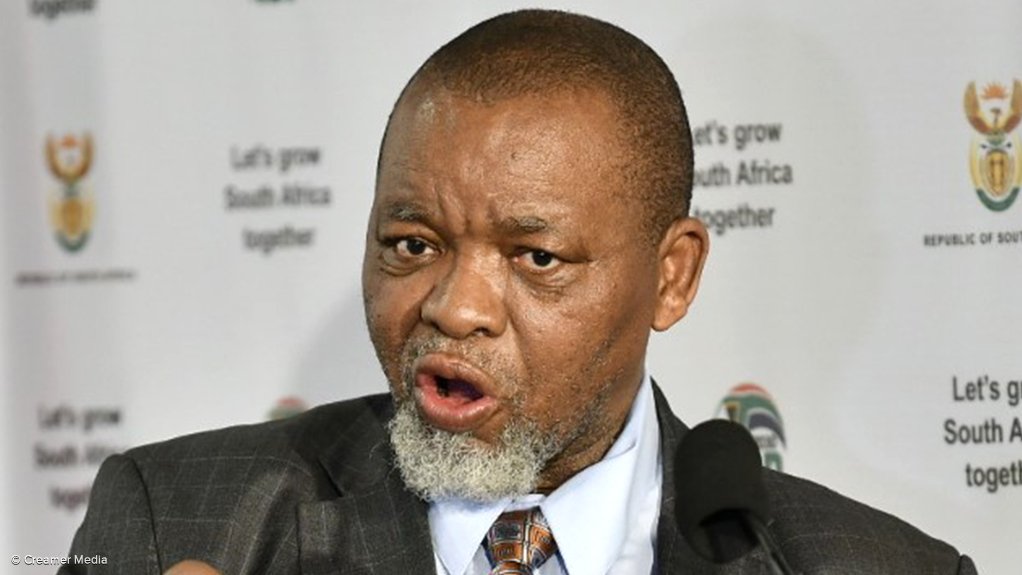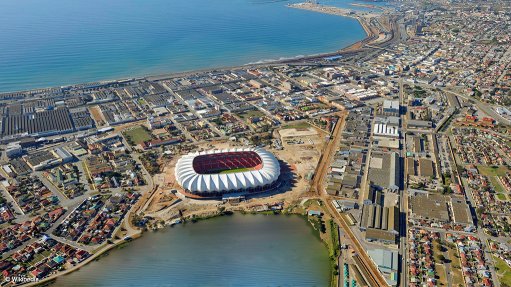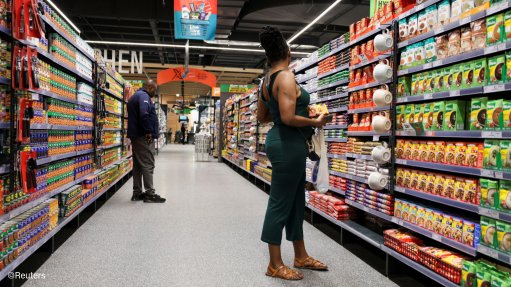Coal can ‘reinvent itself’, CGS must play role in the energy transition – Mantashe


Mineral Resources and Energy Minister Gwede Mantashe
Photo by Creamer Media's Donna Slater
During his keynote address at the Council for Geoscience (CGS) Summit, held at the Durban International Convention Centre from October 25 to 27, Minerals and Energy Minister Gwede Mantashe expressed his belief that coal could “reinvent itself”, given sufficient investment.
Mantashe cited the CGS’s lead role in the pilot carbon capture, utilisation and storage project in Leandra, Mpumalanga. The project, which is expected to become operational in early 2024, will test the feasibility of injecting between 10 000 t to 50 000 t of carbon dioxide a year, to a depth of at least 1 km.
He described the project as one that “gives [ . . .] hope that our Just Energy Transition programme can be attained [using] one of our most valuable commodities. One that has provided baseload for the country.”
On the subject of coal, he noted that, while the government’s commitment to “international protocol on climate change remains resolute”, the transition from a high- to a low-carbon economy might be achieved with coal as part of the solution, should the hypothesis of clean coal prove viable.
He stressed that the energy transition should not hinder electricity access, commenting on the pressure on developing countries to decarbonise, despite their inability to provide access to the vast majority of their citizens.
To that end, he suggested that some activists’ calls for the eradication of coal were short-sighted, pointing to the energy challenges in Europe following Russia’s decision to cut gas supply to the region. He noted that South Africa’s coal exports to Europe rose by 720% as a result.
He commented that the CGS’s role in the Just Energy Transition (JET) was to ask members to foster a discussion around energy solutions, adding that current engagements were too polarising.
In addition to pointing out that South Africa’s future energy mix would incorporate a variety of energy sources, including nuclear, as a potential replacement for baseload supply in the longer term, he stated: “As we seek all manner of sources of sustainable energy sources, sources such as geothermal must be considered in South Africa. The preliminary research undertaken by the CGS illuminates this prospect, albeit at early stages. Every effort must be put into confirming the prospects to enrich our energy basket.”
The CGS also has a key role in helping South Africa find and extract critical minerals. “Any new technology, any green technology, requires [inputs] that are grown, or mined”, and the CGS acts as a repository of the geological information and data that underpins the mining industry.
“We have allocated an additional R500-million to the CGS in the current cycle of the Medium-Term Expenditure Framework to accelerate geomapping in support for exploration,” he added, highlighting that the Geoscience Act empowers the CGS to undertake exploration.
The Minister stressed that he was expecting the organisation to work with the private sector to re-catalyse exploration activities in the country, in line with current geological potential.
“As the world’s economic trajectory demands a new suite of minerals deemed to be critical minerals for lower carbon footprint, there has never been a better time for the geoscience communities to work together and prepare to unravel the possibilities of South Africa as a source of these minerals.”
He added that the trend toward modernising geological mapping required a greater need for rapid collection, interpretation, and integration of mapping data and the dissemination of the products to clients and stakeholders in digital formats that were accessible using the Internet.
As such, the government has taken a deliberate decision to resource the CGS to embed applications of artificial intelligence in the context of the Fourth Industrial Revolution.
Mantashe also lauded the CGS for assisting with the problem of illegal mining. “I appreciate the responsiveness of the CGS in speedily developing illegal mining tracker technique using geoscientific techniques, which will detect illegal mining activities well in advance and communicate with the law enforcement authorities to deal timeously with such activities.”
Article Enquiry
Email Article
Save Article
Feedback
To advertise email advertising@creamermedia.co.za or click here
Announcements
What's On
Subscribe to improve your user experience...
Option 1 (equivalent of R125 a month):
Receive a weekly copy of Creamer Media's Engineering News & Mining Weekly magazine
(print copy for those in South Africa and e-magazine for those outside of South Africa)
Receive daily email newsletters
Access to full search results
Access archive of magazine back copies
Access to Projects in Progress
Access to ONE Research Report of your choice in PDF format
Option 2 (equivalent of R375 a month):
All benefits from Option 1
PLUS
Access to Creamer Media's Research Channel Africa for ALL Research Reports, in PDF format, on various industrial and mining sectors
including Electricity; Water; Energy Transition; Hydrogen; Roads, Rail and Ports; Coal; Gold; Platinum; Battery Metals; etc.
Already a subscriber?
Forgotten your password?
Receive weekly copy of Creamer Media's Engineering News & Mining Weekly magazine (print copy for those in South Africa and e-magazine for those outside of South Africa)
➕
Recieve daily email newsletters
➕
Access to full search results
➕
Access archive of magazine back copies
➕
Access to Projects in Progress
➕
Access to ONE Research Report of your choice in PDF format
RESEARCH CHANNEL AFRICA
R4500 (equivalent of R375 a month)
SUBSCRIBEAll benefits from Option 1
➕
Access to Creamer Media's Research Channel Africa for ALL Research Reports on various industrial and mining sectors, in PDF format, including on:
Electricity
➕
Water
➕
Energy Transition
➕
Hydrogen
➕
Roads, Rail and Ports
➕
Coal
➕
Gold
➕
Platinum
➕
Battery Metals
➕
etc.
Receive all benefits from Option 1 or Option 2 delivered to numerous people at your company
➕
Multiple User names and Passwords for simultaneous log-ins
➕
Intranet integration access to all in your organisation



















